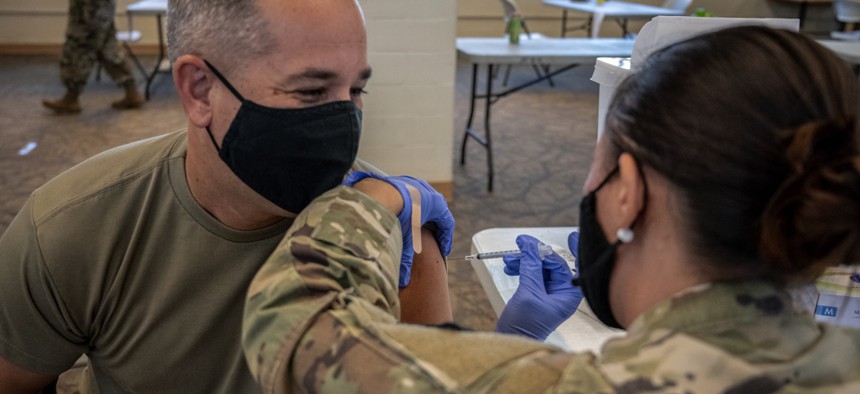
Maj. Eric Korpi, a human resource officer with Joint Task Force Headquarters, Hawaii National Guard Joint Task Force received the Pfizer-BioNTech vaccine on October 1, 2021, at the Hawaii Army Readiness Center, Kalaeloa, Hawaii. U.S. Army National Guard / 1st. Lt. Anyah Peatross
Vax Refusal Poised to Deepen National Guard’s End-Strength Shortage
The Guard is missing its goals for the first time in several years, and worse is expected to come.
The National Guard will fall about 9,000 people short of its end-strength goals this fiscal year, a roughly two-percent deficit that is expected to deepen over the next two years by troops who refuse the COVID-19 vaccine, Guard officials said Tuesday.
National Guard recruiters “have told me pretty much unanimously in every location I go just how difficult the current recruiting challenges are that they're facing. For many of them, it's unprecedented in their time as a recruiter,” Army Gen. Daniel Hokanson, the chief of the National Guard Bureau, told reporters Tuesday.
The Army National Guard reached just over 98 percent of its end-strength authorization, or 6,000 short of 336,000 troops for fiscal 2022, Hokanson said. The Air National Guard has reached about 97.2 percent of its roughly 108,000-person end-strength goal, leaving it 3,000 short when the fiscal year ends this month. End-strength numbers are affected by recruiting as well as retention of current members.
Hokanson is concerned by those deficits in part because the Guard has met their end-strength goals in recent years.
Hokanson attributed the Guard’s recruiting challenges to several things, including competition with industry and academia, the small percentage of youth who meet standards, and the limited exposure people have to military life and opportunities available to them.
For 2023, the Army National Guard again has a goal of 336,000 soldiers. They may have to adjust that number in 2024 if thousands of troops who have refused the coronavirus vaccine and have not received an exception to policy are kicked out, Anson Smith, the deputy chief of the Army National Guard strength maintenance division, told reporters.
About 9,000 soldiers have refused the vaccine so far and could be kicked out in 2023, Smith said, and they anticipate another 5,000 could be kicked out in 2024. No one has been removed from the Army National Guard for vaccine refusal yet, Smith said, because they are still waiting for the “phase two memorandum” from Army Secretary Christine Wormuth.
“And so as we go into [fiscal year 2024] and beyond, that will be factored into our overall mission, and those losses that we will have to make up based on those individuals who choose to not get COVID [vaccine],” Smith said.
The Guard is not alone in its difficult quest for recruits. In July, Wormuth and the Army’s chief of staff called the situation the “most challenging recruiting environment since the All-Volunteer Force was established in 1973.”







